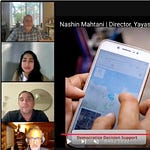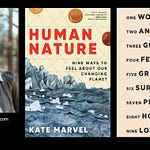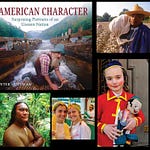I’ve spent a lot of time assessing ways to defeat what I call the “complexity monster” impeding climate and energy solutions. Here’s a Sustain What webcast on a fresh approach, including building a big welcome table instead of walls. Also watch and share on Facebook, X/Twitter, YouTube, LinkedIn. (Here’s a rough Trint transcript.)
I was intrigued to learn about an upcoming set of live seminars offering ways to stay cool, connected and effective amid the nonstop turbulence around and within our fossil-fuel-heated climate system. The workshop, called “Embracing our Emergency,” is being led later this spring by the progressive Emmy-winning filmmaker Josh Fox, best known for his HBO documentary “Gasland,” and the wide-ranging author and convener
.As Fox and Pinchbeck explain in our chat, they’re convening an array of guests, from
to Jane Fonda and Xiye Bastida, to help build a community that can better understand and navigate today’s polycrisis. There are 10 live sessions between April 28 and May 29. You can learn more and register here. There’s a fee but they say there are discounts if needed.A key focus, Fox says, is to encourage progressives to focus urgently on building resilience now for populations most at risk (a core theme of my writing here of course) even as they work to cut greenhouse gas emissions. Another, he says, is reinforcing the reality this is a marathon, not a sprint (echoing a core theme of my Dot Earth blog):
Activism in general is like being an attention deficit disorder marathon runner. You know, you constantly think the race is going to be over the next 20 seconds. And yet it's going to go on for your whole life. So you have to constantly be re re-energizing and re-engaging.
Pinchbeck posted about the project on his Substack newsletter and there’s an excerpt below, along with a link to a free guide to “Seven Essential Tools For Surviving - and Thriving - in a Time of Climate Crisis.”👇
Some of the resulting funds from the seminars will go to helping Fox finish his latest film, “The Welcome Table,” which explores the surging flows of human dislocation and migration being propelled by hot spots of political and climatic turmoil and profound imbalances in economic opportunity.
He began reporting and filming for this project six years ago and has built a vivid worldwide picture of the lives of dislocated populations around the world and within the United States. As he explains in our conversation, the film centers on a keystone idea - that building a bigger “welcome table” is far more likely to foster thriving in the United States and elsewhere than building walls.
I reached Fox in New Orleans, where he’s preparing for the film’s grand finale - chronicling the construction of a 1,000-foot-long table on a levee threatened by rising seas and a celebratory gathering around that welcome table featuring many of the people featured in the film. You can attend on April 10.
Migrant fear, circa 1903
We talked about the cyclic nature of immigration surges and reactionary surges of nationalism and hatred. He mentioned a century-old cartoon that he found for the film, “The Unrestrictied Dumping-Ground,” which depicts Uncle Sam overwhelmed by waves of ratlike Italian immigrants. Here’s that excerpt from our discussion.
Fox said:
Can you imagine New York City without pizza? Can you imagine America without pizza, without bagels?
What is the pizza in 100 years going to be? We do know these people are going to be a benefit to us. It’s our benefit to celebrate culture rather than ostracize and criminalize. And if we haven’t learned this lesson by now we don’t know what America is.
I couldn’t agree more.
From the great clips I’ve seen, the film is coming together in Fox’s inimitable and creative style, meshing music, events and other arts with gripping footage and his wry wit. I’ll do more on the film later this year. Here’s the trailer:
One of the remarkable people in the film is the Nigeria-born singer songwriter Chris Obehi, who fled his hometown in the Niger delta in 2015 as a minor and made a harrowing journey to Palermo in Sicily including a kidnapping and imprisonment in Libya and - no surprise - a perilous Mediterranean crossing.
A profile of Obehi by Emma Wallis for the collaborative InfoMigrant news project picks up the story:
[H]e managed to make it onto an inflatable boat, and he was a couple of days into the voyage when a rescue ship arrived.
"I was crying you know. The boat was shaking and water was getting in. There were babies inside crying. We were 105 people." Again, Chris is not sure anymore which boat picked them up but he remembers the fear he felt: "It was night and this very big boat came towards us very slowly."
People were fighting, he remembers, and the boat was taking on water. Some were crying, some praying. "There were some casualties," he says with a tone of sadness in his voice. When the 'big boat' arrived, Chris saw a little boy who appeared to have become separated from his family. He says his survival instinct kicked in, and he picked him up from the boat to stop him from being crushed.
"I went close to the little boy, I touched him and he was so cold. I put him very close to me. I couldn’t just leave him alone." By taking responsibility for the infant, Chris got lifted off the ship as one of the first. In saving him, Chris was saved too. Many of the others on the boat ended up in the water.
His song Non Siamo Pesci (We are Not Fish) is simply wonderful.
Here’s Daniel Pinchbeck’s theory behind the course (from his Substack post) and the companion guide to seven tools for thriving while embracing this moment:
I feel that many people remain inactive because they toggle between two extreme positions: One common belief is that we are utterly doomed and everyone will die soon as a result of the biospheric catastrophe, hence there is nothing we can do and we might as well go on with “business as usual” until the last second. The polar opposite belief, held by many, is that new technologies will somehow save the situation without us having to massively change our lifestyles or alter our consumption habits. (The most common strategy, by far, is to ignore the situation entirely, surrender to social inertia, and wait until change is forced upon you.)
Let’s consider another option: Temperatures will rise several degrees in the next decades leading to intensifying catastrophes. Even so, the world won’t end all of a sudden. Most will survive. We will find ourselves trying to build decent lives and new communities in unfamiliar circumstances.
If we accept this as a plausible or perhaps even the most likely option, then it would be incredibly smart to start retooling, re-skilling, rethinking and even redirecting our lives, now, in resonance with the changes that are already happening and will increasingly intensify.
The seven tools and traits they describe are critical thinking, resilience, flexibility, simplicity, collaboration, openness, participation. Here’s the download:
So please share and listen to this webcast and let me know your thoughts. And please subscribe to Sustain What, and chip in financially if you can so I can justify the time required to plan and run these conversations and digest them here!
I’m also reminded of the work of the futurist and climate resilience guide
. When you have time, listen to our chat two years ago - and of course subscribe to his Snap Forward column:
















Share this post